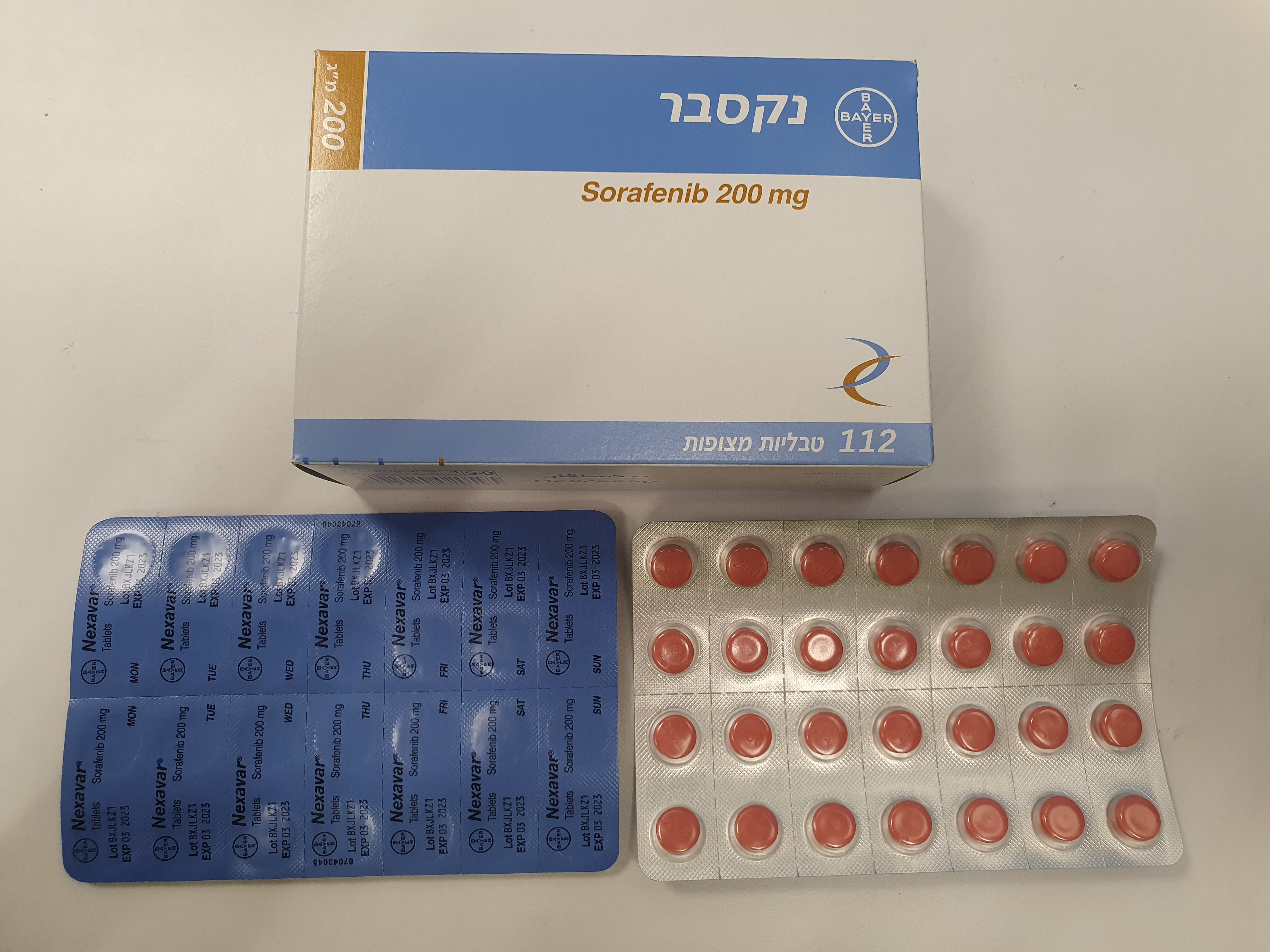Quest for the right Drug

נקסבר NEXAVAR ® (SORAFENIB AS TOSYLATE)
תרופה במרשם
תרופה בסל
נרקוטיקה
ציטוטוקסיקה
צורת מתן:
פומי : PER OS
צורת מינון:
טבליות מצופות פילם : FILM COATED TABLETS
עלון לרופא
מינוניםPosology התוויות
Indications תופעות לוואי
Adverse reactions התוויות נגד
Contraindications אינטראקציות
Interactions מינון יתר
Overdose הריון/הנקה
Pregnancy & Lactation אוכלוסיות מיוחדות
Special populations תכונות פרמקולוגיות
Pharmacological properties מידע רוקחי
Pharmaceutical particulars אזהרת שימוש
Special Warning עלון לרופא
Physicians Leaflet
Posology : מינונים
4.2 Posology and method of administration Nexavar treatment should be supervised by a physician experienced in the use of anticancer therapies. Posology The recommended dose of Nexavar in adults is 400 mg sorafenib (two tablets of 200 mg) twice daily (equivalent to a total daily dose of 800 mg). Treatment should continue as long as clinical benefit is observed or until unacceptable toxicity occurs. Posology adjustments Management of suspected adverse drug reactions may require temporary interruption or dose reduction of sorafenib therapy. When dose reduction is necessary during the treatment of hepatocellular carcinoma (HCC) and advanced renal cell carcinoma (RCC), the Nexavar dose should be reduced to two tablets of 200 mg sorafenib once daily (see section 4.4). When dose reduction is necessary during the treatment of differentiated thyroid carcinoma (DTC), the Nexavar dose should be reduced to 600 mg sorafenib daily in divided doses (two tablets of 200 mg and one tablet of 200 mg twelve hours apart). If additional dose reduction is necessary, Nexavar may be reduced to 400 mg sorafenib daily in divided doses (two tablets of 200 mg twelve hours apart), and if necessary further reduced to one tablet of 200 mg once daily. After improvement of non-haematological adverse reactions, the dose of Nexavar may be increased. Paediatric population The safety and efficacy of Nexavar in children and adolescents aged < 18 years have not yet been established. No data are available. Elderly population No dose adjustment is required in the elderly (patients above 65 years of age). Renal impairment No dose adjustment is required in patients with mild, moderate or severe renal impairment. No data is available in patients requiring dialysis (see section 5.2). Monitoring of fluid balance and electrolytes in patients at risk of renal dysfunction is advised. Hepatic impairment No dose adjustment is required in patients with Child Pugh A or B (mild to moderate) hepatic impairment. No data is available on patients with Child Pugh C (severe) hepatic impairment (see sections 4.4 and 5.2). Method of administration For oral use. It is recommended that sorafenib should be administered without food or with a low or moderate fat meal. If the patient intends to have a high-fat meal, sorafenib tablets should be taken at least 1 hour before or 2 hours after the meal. The tablets should be swallowed with a glass of water.

פרטי מסגרת הכללה בסל
1. התרופה תינתן לטיפול במקרים האלה: א. סרטן כליה מתקדם או גרורתי (גם כקו טיפול ראשון). ב. סרטן הפטוצלולרי מתקדם לחולים המוגדרים כ-Child Pugh's A. ג. סרטן מתקדם מקומי או גרורתי של בלוטת התריס מסוג DTC (Differentiated (papillary / follicular / Hurthle cell) thyroid carcinoma) עמיד ליוד רדיואקטיבי.2. מתן התרופה האמורה ייעשה לפי מרשם של מומחה באונקולוגיה או מומחה באורולוגיה המטפל באורולוגיה אונקולוגית
מסגרת הכללה בסל
התוויות הכלולות במסגרת הסל
| התוויה | תאריך הכללה | תחום קליני | Class Effect | מצב מחלה |
|---|---|---|---|---|
| סרטן כליה מתקדם או גרורתי (גם כקו טיפול ראשון). | 30/01/2020 | אונקולוגיה | Renal cell carcinoma | |
| סרטן כליה מתקדם או גרורתי (גם כקו טיפול ראשון). במהלך מחלתו יהיה החולה זכאי לטיפול בשלוש תרופות בלבד מהתרופות המפורטות להלן - Sunitinib, Sorafenib, Everolimus, Temsirolimus, Pazopanib, Axitinib, Nivolumab. הטיפול בתכשיר לא יינתן בשילוב עם Nivolumab או עם תרופה ממשפחת מעכבי mTOR. | 12/01/2017 | אונקולוגיה | Renal cell carcinoma | |
| סרטן מתקדם מקומי או גרורתי של בלוטת התריס מסוג DTC (Differentiated (papillary / follicular / Hurthle cell) thyroid carcinoma) עמיד ליוד רדיואקטיבי | 15/01/2015 | אונקולוגיה | Differentiated thyroid carcinoma, DTIC | |
| סרטן כליה מתקדם או גרורתי (גם כקו טיפול ראשון). במהלך מחלתו יהיה החולה זכאי לטיפול בשתי תרופות בלבד מהתרופות המפורטות להלן – SUNITINIB, SORAFENIB, EVEROLIMUS, TEMSIROLIMUS. | 03/01/2010 | אונקולוגיה | Renal cell carcinoma | |
| סרטן הפטוצלולרי מתקדם לחולים המוגדרים כ-Child Pugh's A. | 01/01/2009 | אונקולוגיה | Hepatocellular carcinoma | |
| התרופה תינתן לטיפול בסרטן כליה מתקדם. קיבל החולה טיפול באחת מהתרופות Sorafenib או Sunitinb, לא יקבל טיפול בתרופה האחרת | 01/03/2008 | אונקולוגיה | Renal cell carcinoma |
שימוש לפי פנקס קופ''ח כללית 1994
לא צוין
תאריך הכללה מקורי בסל
01/03/2008
הגבלות
תרופה מוגבלת לרישום ע'י רופא מומחה או הגבלה אחרת
מידע נוסף
עלון מידע לרופא
04.08.22 - עלון לרופאעלון מידע לצרכן
25.04.22 - עלון לצרכן אנגלית 04.08.22 - עלון לצרכן עברית 25.04.22 - עלון לצרכן ערבית 15.11.22 - עלון לצרכן אנגלית 15.11.22 - עלון לצרכן עברית 15.11.22 - עלון לצרכן ערבית 17.01.12 - החמרה לעלון 23.02.12 - החמרה לעלון 11.11.12 - החמרה לעלון 10.10.13 - החמרה לעלון 27.07.14 - החמרה לעלון 17.02.16 - החמרה לעלון 18.12.18 - החמרה לעלון 02.02.20 - החמרה לעלון 23.03.20 - החמרה לעלון 31.08.21 - החמרה לעלון 04.08.22 - החמרה לעלוןלתרופה במאגר משרד הבריאות
נקסבר